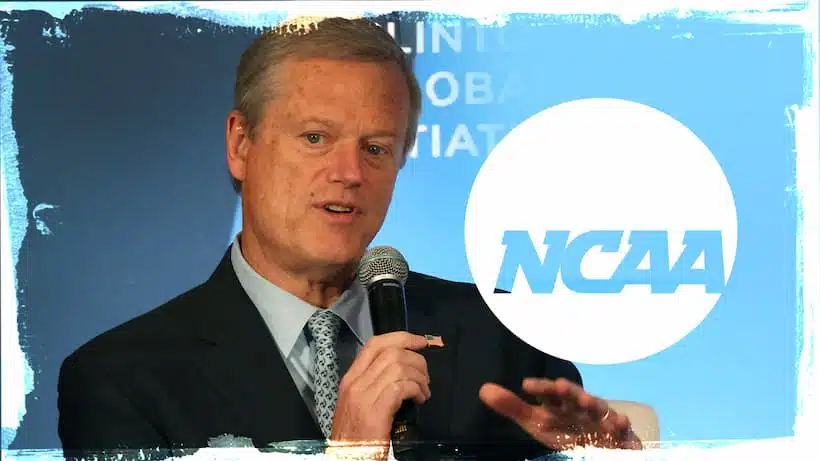Legal sports gambling has been on the rise in recent years. In 2018, the Supreme Court took down the Amateur Sports Protection Act. Since then, 38 states including the District of Columbia and Puerto Rico have legalized some form of Sports Gambling.
Recently, NCAA President Charlie Baker said that college sports prop betting was out of control. He’s calling to ban sports prop betting on collegiate players. Baker claims it’s affecting student-athletes across the country.
With sports gambling continuing to become more popular, will the NCAA ever be able to stop people from prop betting on collegiate athletes?
NCAA President Wants To Ban Player Props In College Sports
Charlie Baker has been the President of the NCAA for a little over a year now since assuming the position on March 1, 2023. A few weeks ago, the 67-year-old made comments about college sports prop betting becoming a major issue for NCAA student-athletes.
Baker claims that sports betting is threatening the integrity of the game while subjecting student-athletes to harassment and other mental health challenges. To try and stop this from happening, Baker says the NCAA is working with states to try and ban college sports prop betting.
“Sports betting issues are on the rise across the country with prop bets continuing to threaten the integrity of competition and leading to student-athletes getting harassed,” Baker said in statement posted on X by NCAA News. “The NCAA has been working with states to deal with these threats and many are responding by banning college prop bets.”
Currently, 38 states, including the District of Columbia and Puerto Rico, have legalized some form of Sports Gambling. Additionally, 30 states and D.C. allow online wagering, making it even easier for prop bets to be placed on collegiate athletes.
While Charlie Baker wants to ban player props, Senior Vice President of the American Gaming Association Chris Cylke thinks that’s a bad idea, claiming that it would make tracking irregularities even more difficult.
Gambling Subjects Student-Athletes To More Hate & Criticism
Now that it’s normal for bettors to place wagers on player props in college sports, NCAA President Charlie Baker is stepping up to protect all student-athletes from hate and criticism.
The problem isn’t unique to just college athletes, either. Even players in professional leagues like the NBA have seen more hate online because of increased gambling. Pacers’ Tyrese Haliburton said that his social media is full of hate and negative comments about people betting on his player props.
A professional like Haliburton is better equipped to deal with the hate and negativity from fans. However, the same cannot be said about collegiate athletes who can be as young as 18 years old.
San Diego State head coach Brian Dutcher also believes that negative criticism is not good for players’ mental health. “People complaining about how they’re playing, missing shots, and they just get beat up constantly,” said Dutcher during his team’s March Madness run.
Will the NCAA ever be able to put an end to college sports prop betting?
Point-Shaving Scandals Are Nothing New For The NCAA
Point-shaving scandals have been happening in the NCAA for decades now. The most recent report came on March 7 in a college basketball game between the Univerity of Alabama-Birmingham Blazers and the Temple Owls.
U.S. Integrity, a company that is used by professional sports leagues and college conferences to monitor betting activity, spotted suspicious betting activity and alerted casinos before the start of the game.
The original line for that game favored UAB (-1.5). However, the line jumped to (-8) and eventually (-7) by tip-off. As a result, the line movement was flagged as highly suspicious.
Sports Illustrated’s Pat Forde reported that no late injuries or suspensions were announced, which would have drastically moved the line. According to a recent report, U.S. Integrity had been monitoring Temple’s men’s basketball games for a while.
Of course, this isn’t the first time that the integrity of college sports has been questioned since sports betting became legal. Last year, several student-athletes from Iowa and Iowa State were charged in connection with an investigation into illegal gambling. For some athletes, the probe also triggered NCAA penalties that ended their collegiate careers.
Whether gambling is legal or illegal, point-shaving scandals continue to happen at the college level.








